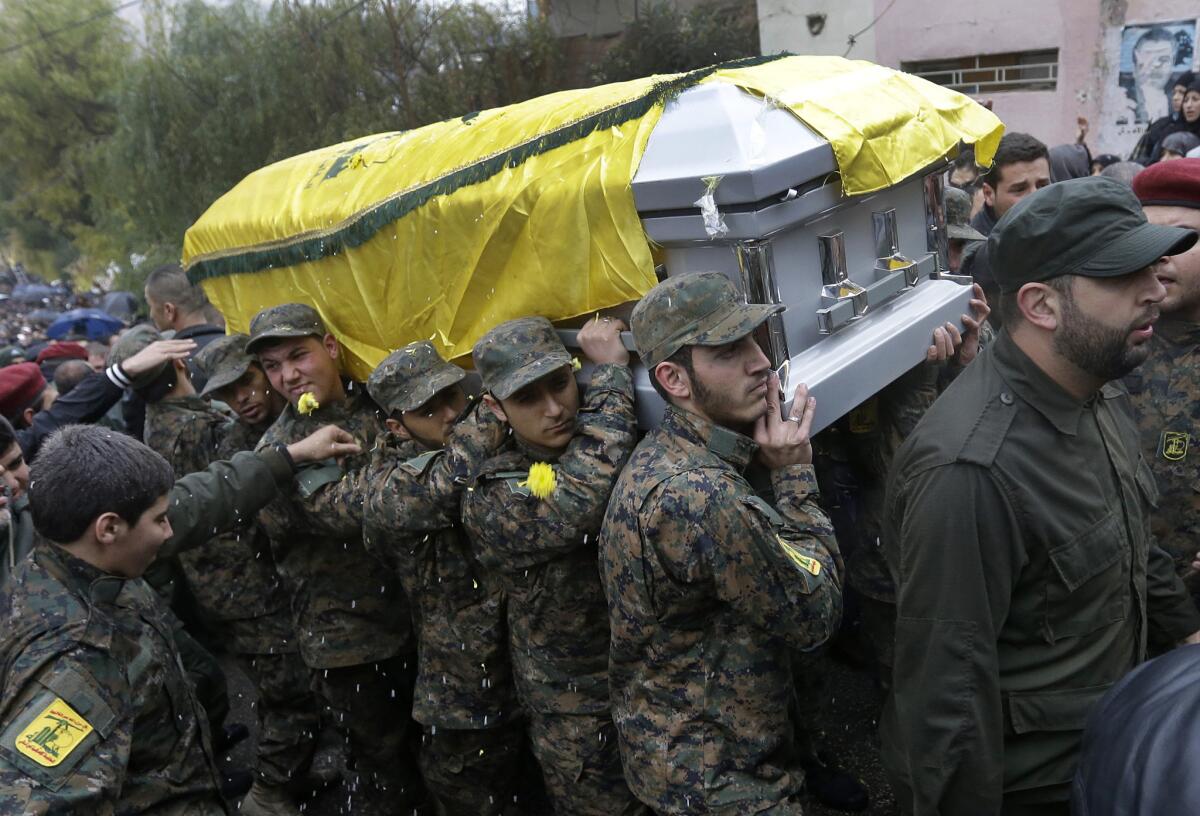Senior Hezbollah commander killed in Beirut

- Share via
DUBAI, United Arab Emirates – A senior Hezbollah commander was gunned down in Beirut early Wednesday in what could be a sign of further sectarian escalation and spillover from the Syrian conflict into Lebanon.
Hassan Holo Laqqis, 53, a founding member of Hezbollah, was shot and killed outside his home in a Shiite Muslim neighborhood of the Lebanese capital, according to Al Manar, the official media arm of the Shiite militant group.
Hezbollah blamed longtime enemy Israel for the killing, but Israeli officials denied responsibility. “We are not particularly sad about it, but we had no part in this,” Energy Minister Silvan Shalom told Israel Radio.
It is common for Hezbollah to blame Israel for unexplained attacks, and Israel has a history of targeting Hezbollah leaders. In a significant departure, Hezbollah’s leader on Tuesday accused Saudi Arabia, not Israel, of orchestrating double suicide bombings that killed 25 people at the Iranian Embassy in Beirut last month.
Iran is a major sponsor of Hezbollah and, like Hezbollah, is a major supporter of Syria’s embattled president, Bashar Assad. Hezbollah’s involvement in the Syrian civil war has fueled sectarian tensions in Lebanon between Shiite and Sunni Muslims, although it was not immediately clear whether those tensions played a role in Laqqis’ death.
A previously unknown group calling itself the Free Sunnis of Baalbek Battalion claimed responsibility for the killing in a series of tweets, although neither the claim nor the existence of the group could be confirmed.
“Hezbollah is warned from attacking any free person from the free people of the Sunnis in Baalbek and threatens that this operation is merely the beginning of the great battle of purification,” one of the tweets said. Baalbek is a mountainous Lebanese region that borders Syria and is considered a Hezbollah stronghold.
Laqqis, who had been a member of Hezbollah since his youth, had been the target of previous assassination attempts. Hezbollah spokesman Ibrahim Moussawi said that Israel “tried several times to get our brother in more than one area, and its attempts had failed until the ... operation last night.”
The killing marks the first time a Hezbollah commander has been openly assassinated in Lebanon, according to Amal Ghorayeb, a Lebanese-based Hezbollah expert.
“This represents a new phase in the intelligence war,” she said.
In Israel, Laqqis’ death was portrayed as a significant setback for Hezbollah.
“This is a very harsh blow for Hezbollah,” said Shalom, the energy minister. He said Hezbollah has been weakened by its involvement in Syria.
The killing came two weeks after Beirut was rocked by the two suicide bombings at the Iranian Embassy. Three other attacks that appear linked to the Syrian conflict have taken place in Lebanon in recent months, including two explosions in August outside a Sunni mosque in the northern city of Tripoli that killed more than two dozen people.
The Al Qaeda-linked Abdullah Azzam Brigades claimed responsibility for the Iranian Embassy attack, calling it a “double martyrdom operation carried out by two heroes from the heroic Sunnis of Lebanon.”
But Hezbollah’s general secretary, Hassan Nasrallah, said in an interview on Lebanon’s OTV channel that “my conviction is they are tied to Saudi intelligence, and Saudi intelligence runs such groups in more than one location in the world.”
There was no immediate response from Saudi Arabia, which is Iran’s chief rival for influence in the Middle East. Saudi Arabia is officially Sunni; Iran’s Islamic government is Shiite.
Nasrallah’s accusation was a significant change from Hezbollah’s routine assignment of blame on Israel for all such attacks, which is intended to “defuse sectarian tensions,” said Ghorayeb, the Hezbollah expert. “It was unprecedented,” she added.
Ghorayeb said the fact that Nasrallah was willing to make such an accusation could indicate that “there is hard evidence of this involvement, not merely hearsay or rumors.”
In the live two-hour interview, Nasrallah also promised that the Lebanese group will ultimately be thanked for its military intervention in the Syrian conflict, while insisting that Hezbollah did not “enter Syria due to an Iranian decision, but due to an internal one.”
The interview was Nasrallah’s first public appearance after the U.S.-led nuclear agreement with Iran, which he hailed as an agreement in which the “biggest winners are the peoples of the region, by ruling out the option of war.”
“I do not believe Israel would bomb the nuclear installations in Iran without an American green light,” he added.
Hezbollah, which is not only a dominant political player but also the most powerful Lebanese armed militia, has been widely criticized for its unflinching support of Assad, who is a member of an offshoot sect of Shiite Islam.
ALSO:
Biden arrives in China amid tensions over air defense zone
Nelson Mandela not well but still teaching lessons, his family says
U.S. halts truck shipments through Pakistan amid anti-drone protests
Bulos is a special correspondent. Times staff writer Raja Abdulrahim in Los Angeles and news assistant Batsheva Sobelman in The Times’ Jerusalem bureau contributed to this report.
More to Read
Sign up for Essential California
The most important California stories and recommendations in your inbox every morning.
You may occasionally receive promotional content from the Los Angeles Times.











